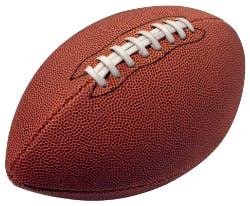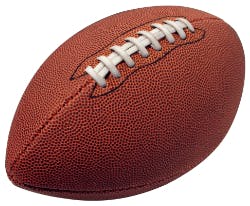What it takes to win the game: NFL star vs. dental hygiene student
Football is the most popular sport in the United States. The players are extremely well-paid and are carefully selected via a draft to be in the National Football League. Dental hygienists are professionals who promote oral health.
What do those two completely different fields have in common? As the founder of one of the most trusted online dental hygiene boards prep courses, I have coached numerous students across the country. I am continuously inspired by the hard work dental hygiene students put into “winning the game.” The dental hygiene boards (NBDHE, CSCE, WREB, CRDTS) are extremely difficult exams, and this gave me the idea to compare the NFL players and dental hygiene students. For both the players and dental hygiene students, the rule of “you make a mistake, then you go home” applies.
“It is about winning the game”
1. Create a study schedule vs. create a practice schedule
Aaron Rodgers, the Green Bay Packers’ quarterback, goes into “training camp” to prepare for each football season. During camp, Rodgers follows a strict schedule that is created to maximize his physical and mental ability for the upcoming season. He knows that discipline is key for him and his team.
As a dental hygiene student, you create a vigorous study schedule that includes all subjects you need to know for the examinations. You motivate yourself daily to achieve your goals while blocking out distractions to stay focused.
For example, let’s say you have 20 subjects to study and you estimate that each subject will take five days. Take a calendar and block out time for at least 100 days (5 days x 20 subjects) for studying. Also, consider the time you will need for mock exams and extra reviews. Ideally, try to repeat a pattern for at least 21 days. After this period, your body and brain will have adopted the healthy habit as second nature. Studying will stop feeling so difficult!
2. Memorize medical/dental content vs. memorize the plays
Mike Tomlin, the head coach of the Pittsburgh Steelers, studies the opponent’s strategies and create a game plan. There can be hundreds of plays to be memorized and rehearsed by the players before each game.
As a dental hygiene student, you have to review an extraordinary amount of dental and medical content. Memorization is the first step to solving basic science-based questions and more complicated case studies.
The dental hygiene board examinations (NBDHE, CSCE, WREB, CRDTS) are extremely demanding. You are pushed to a limit that you may have never experienced before. I strongly advocate all students to use memory tricks that even memory champions use. Memory tricks work as follows:
- Observe the information
- Substitute the word into something you already know
- Relate the substitution with a funny story.
Let me help you translate that into the dental context. The drug phenytoin is an anti-seizure drug and is associated with gingival hyperplasia. Now see the “phen” in the drug name and substitute it to “fan” (they sound the same). Then imagine a round fan on the patient’s gum. Does this help you relate the roundness of the gum to gingival hyperplasia? If yes, I bet you will not forget this information for the rest of your life. If we use this memory technique to everything we learn, studying for the dental hygiene board examinations can become fun and efficient.
“It would be a costly mistake to show up for one of the most important tests of your life without putting yourself through a “real experience.”
3. Practice mock exams vs. practice plays
The Atlanta Falcons’ players know the game rules are and they condition themselves to perform at their best regardless of the conditions. They tirelessly rehearse for the game, rain or shine.
As a dental hygiene student, you need to understand the rules of the dental hygiene boards. Then you rehearse a full mock exam that consists of the same number of questions and time as the actual exam before the “big day.”
It would be a costly mistake to show up for one of the most important tests of your life without putting yourself through a “real experience.” That experience should be on a computer with questions that simulate the real exams as closely as possible. Ideally, the mock exam will also have a timer.
There are a few options for you such as the textbook CDs or StudentRDH online review. This allows you to see if you are ready to take the test, how you manage time, and what you can do to overcome the stress before the “big day.” This is especially important if you are preparing for the NBDHE (National Dental Hygiene Board Examination), as it is a 9-hour exam.
4. Use critical thinking when choosing answers vs. use critical thinking when making passes
Tom Brady, the quarterback for the New England Patriots and a future Hall of Famer, will encounter a play did not go as planned. Brady intelligently analyzes the situation and takes a few seconds to screen the opponent’s defense. Then he chooses a pass that has the highest probability to be completed.
As a dental hygiene student, you carefully read the question and scan the answer choices. When the answer does not stand out, you need to weigh each option and make a choice.
I would like to emphasize the importance of always be in the mindset of choosing the “best” option rather than the “only” answer. I taught numerous students, and I found the #1 mistake is to jump into conclusion too quickly. Never choose an answer without going through the “process of elimination.” Ask yourself how A, B, C, D, or E relate to the questions. Cross out the choices that make the least sense until you get to the one or two best choices. This technique of critical thinking will be extremely useful for testlets and case studies that require your full attention.
“Think about the glorious moment you become the #RDH you deserve to be”
5. Imagine passing the exam vs. imagine winning the game
All NFL teams think about winning every game during the regular season. Even if the team is losing by 10 points, the players and coaches do not let negativity interfere. Athletes know the importance of staying positive until the last second.
As a dental hygiene student, you may feel frustrated about your preparation. If you are in the dental hygiene board examination room, you may feel even more nervous. However, you decide to take a deep breath, shake off the frustration, and think about the glorious moment you become the #RDH you deserve to be.
Our minds are extremely powerful. Our body respond to how we “feel” - a positive attitude brings success while self-doubt brings struggles. One negative thought can trigger a whole chain of fear that is toxic for your performance. When you are studying, think about your bright career that is right in front of your eyes. During the dental hygiene board examinations, think of the time a patient complimented you for being the “best.” When negative thoughts knock on your door, say “no thank you,” and choose to have a winning attitude.
The analogy of NFL or professional sports is applicable to dental hygiene students because the “games” are similarly demanding. As a dental hygiene student, if you can follow the 5 steps mentioned above, know that your “performance” will significantly increase. The goal is #SuccessAndNothingLess.
Claire Jeong is an entrepreneur who is striving to promote success through education. She founded StudentRDH and StudentCDA, which offer review courses for board examinations for dental hygiene students and dental assistant students. The online platform delivers content of the highest quality through the latest e-learning technology. According to some students, studying is now “addicting.” Claire has a master’s degree in administration from Boston University and a dental hygiene degree from Forsyth School of Dental Hygiene in Boston. Prior to her career in the dental field, Claire Jeong was an education specialist at Boston Children’s Museum. Claire is licensed to practice in the United States as well as Canada. She also advocates for efficacy in learning and in life through her articles, speeches, and business. More test-taking techniques on StudentRDH and StudentCDA blogs. She can be contacted at [email protected].
About the Author

Claire Jeong, MS, RDH
Claire Jeong, MS, RDH, is an entrepreneur, author, educator, researcher, and international speaker. She is the founder of SmarterDA/StudentRDH–dental assisting and dental hygiene exam prep solutions. Through her live and online courses, Claire has helped thousands of people gain valuable dental knowledge and clinical skills. She authored the e-book WakeUp Memory, which teaches how to use the brain and remember anything. Claire is regularly invited to podcasts and conferences as a key opinion leader. She also provides guidance to companies to reach the younger generation of dental professionals. Email her at [email protected].

